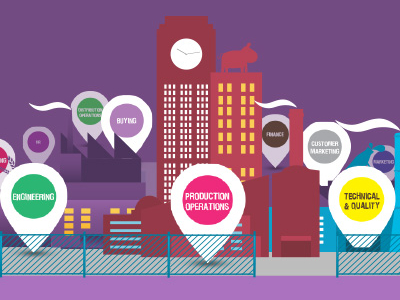What’s it all about then?
The role of the retail merchandiser is extremely important to the financial wellbeing of any organisation as they decide which products to purchase and how these are displayed to best effect.
You’ll need to know all about new products coming on to the market, which of these products customers will like and, of course, which ones will make a profit for your employer, and keep them ahead of the competition.
You’ll use your knowledge to make the final decision on what kind of items are to be purchased for retail and set the limits in which the company buyers act to source the items.
Many retail merchandisers specialise in one area such as food or fashion, so they become experts in their field of work.
What might I be doing?
Your role as a retail merchandiser can vary from company to company but will likely include most of the following tasks:
- liaising closely with buyers and other merchandisers to plan product ranges
- meeting with suppliers, distributors and analysts
- managing budgets
- ordering goods
- forecasting sales and profits and assessing performance
- negotiating prices, quantities and delivery terms
- managing levels and distribution of stock
- ordering goods and handling supply problems
- setting promotions/price reductions as appropriate
- making financial presentations and forecasts to senior managers
- assisting with promotional and advertising campaigns
- setting prices and sales targets for individual stores
- analysing the performance of competitors
What will be expected of me?
To be an effective merchandiser you’ll need to have a high degree of marketing expertise and be able to analyse market trends and consumer buying behaviour.
You’ll need to have excellent communication skills to liaise with your work colleagues and external suppliers. Part of the work also involves presentations to senior managers, so you’ll need to have the confidence to succeed here as well as technical skills (such as IT).
Commercial awareness and the ability to solve problems and make effective decisions are also vital attributes for the merchandiser, because there are times in this role when you’ll be working under a lot of pressure; good numerical and analytical skills are necessary too as you work out budgets and sales figures.
And of course, you’ll be a highly organised person who can be trusted to work using your own initiative to negotiate and communicate effectively.
What can I expect?
As a merchandiser you’ll work mainly office hours, between 8am and 6pm; of course, there will be times when longer hours will be expected, and some travel to meet suppliers and manufacturers.
At times you’ll be working independently and on other occasions you’ll be collaborating with team members to achieve results.
You can expect to work to tight deadlines which makes the work extremely demanding, so you’ll need to be very well organised and motivated. You’ll also be responsible for major budgets, which comes with its own level of stress.
What qualifications do I need to get in?
There aren’t any set requirements although both graduates and non-graduates will have to apply for an entry level post, perhaps as an administrative assistant or similar role.
Whilst employers will consider applicants from a wide variety of backgrounds, those with business and management qualifications may have an edge.
Many retail merchandisers have accountancy, finance, business or marketing degrees, and some retailers may specifically look to recruit graduates. Larger companies may recruit graduate management trainees, and merchandising would be one of a range of skills you would learn as you gain knowledge of all aspects of retailing.
The following qualifications may be useful if you’re interested:
- accountancy and financial management
- business studies
- economics
- ICT
- marketing
- mathematics or statistics
- retail management.
Retail employers will want you to have good numerical skills and relevant experience, so any part time work you’ve done in a shop could be useful, particularly with a major retailer.
Some assistant merchandiser posts require good A-level results, so keep an eye for these as well.
You could also consider undertaking a college course in retail operations and there are several apprenticeships available as well.
A postgraduate qualification isn’t a requirement, although there are courses available.
Where would I get these qualifications?
Many universities offer courses in the subjects as listed above and there is a wide range to choose from.
If you want to study for a more specialised retail qualification, you could consider the following:
- University of Roehampton BSc degree in Retail Marketing and Management;
- Bournemouth University BA degree in Retail Management;
- Leeds Beckett University BSc(Hons) degree in Retail Marketing Management;
- London South Bank University BSc(Hons) degree in Marketing with Retail;
- Canterbury Christchurch University BSc(Hons) degree in Business Management (Retail);
- Southampton Solent University BA(Hons) degree in Fashion Buying and Merchandising.
- Falmouth University in partnership with the Fashion Retail Academy offers 2-year degrees in subjects which include a BA(Hons) in Buying and Merchandising.
A wide range of FE courses and apprenticeships are also available, and you need to check online prospectuses for up to date details.
Remember that the stuff we’ve listed is only to give you a sample of what’s on offer, and other qualifications are available; you should check prospectuses and course finders for the most up to date details.
What about further training?
There are many areas of retail and, when you’re thinking about further training and qualifications, you need to consider your long-term career plans; this will help you select the most appropriate course for your chosen specialism if you have one.
Alternatively, if you’re a graduate or have several years of experience, you could take one of a wide range of postgraduate level courses available throughout the UK to hone your skills further and enhance your career prospects.
Membership of a professional body such as the Chartered Institute of Purchasing and Supply might be useful, and they have a range of relevant qualifications appropriate to your role as a retail merchandiser.
Anything else I might need to know?
Yes, remember that, if you’re working in a large business you’ll likely have responsibility for a range of merchandise whereas those employed in small businesses may have a wider remit, including buying.
Also, remember that when you’re looking a job as a retail merchandiser, make sure you research the role properly, because different employers expect different things, and you don’t want any nasty surprises!
 cy
cy





